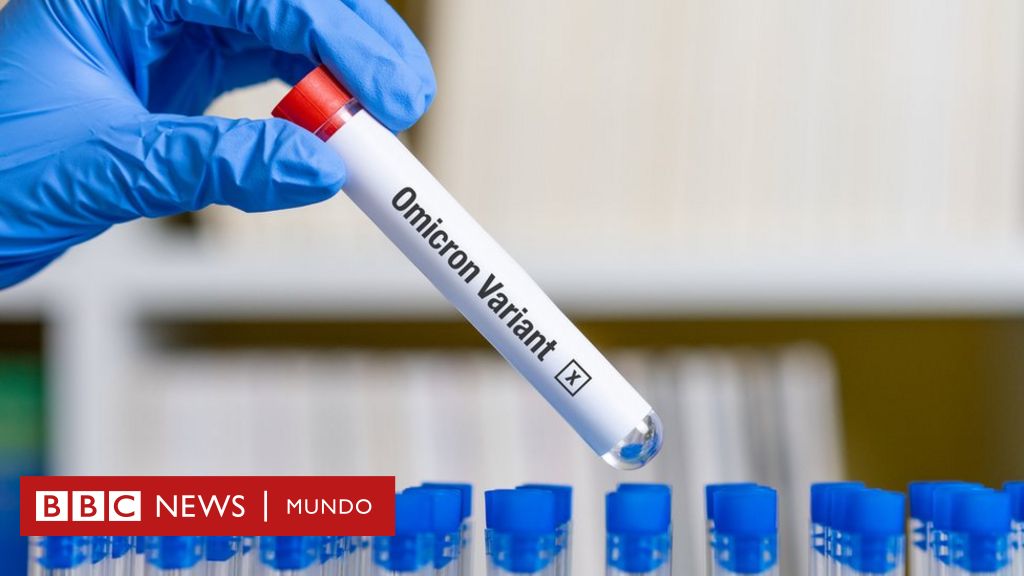- Deborah Fuller*
- The Conversation
—
Image source, Getty Images
—
–
If the omicron variant of the coronavirus is different enough from the parent strain, existing vaccines may not be as effective as they have been so far.
–
If so, companies may need to update their vaccines to better combat omicron.
–
Deborah Fuller is a microbiologist who has been studying mRNA and DNA vaccines for more than two decades.
–
Here he explains why vaccines may need to be updated and what that process would look like.
–
1. Why might vaccines need an update?
Basically the question is about whether a virus has changed enough that the antibodies created by the original vaccine can no longer recognize and defend against the new mutated variant.
–
Coronaviruses use spike proteins to bind to ACE-2 receptors on the surface of human cells and infect them.
–
All covid-19 mRNA vaccines work by giving instructions in the form of mRNA for cells to produce a harmless version of the spike protein.
–
Image source, Getty Images
—
–
This protein then induces the human body to produce antibodies.
–
If a person is ever exposed to the coronavirus, these antibodies bind to the spike protein and therefore interfere with its ability to infect that person’s cells.
–
2. How would a new vaccine be different?
Existing mRNA vaccines, such as those made by Moderna or Pfizer, encode a spike protein from the parent strain of coronavirus.
–
In a new or updated vaccine, the mRNA instructions would encode the omicron spike protein.
–
By exchanging the genetic code of the original protein for that of this variant, a new vaccine would induce antibodies that bindan more effectively to the virus ómicron and avoiden that infect cells.
–
People already vaccinated or previously exposed to COVID-19 would likely need only a single booster dose of a new vaccine to be protected not only from the new strain but also from other strains that may still be in circulation.
–
If omicron emerges as the dominant strain over delta, those who are not vaccinated would only need to receive between two and three doses of the updated vaccine.
–
—
If both delta and omicron are in circulation, it is likely that people should receive a combination of the first and the updated vaccine.
–
3. How do scientists update a vaccine?
To make an updated mRNA vaccine, two ingredients are needed: the genetic sequence of the spike protein of a new variant of interest and a DNA template that would be used to build the mRNA.
–
In most organisms, DNA provides the instructions for making mRNA. Since researchers have already published the genetic code for the omicron protein, what remains to be done is to create a DNA template for the protein that would be used to produce the mRNA portion of the new vaccines.
–
To do this, the researchers mix DNA templates with synthetic enzymes and the four molecular building blocks that make up mRNA: G, A, T, and C for short.
–
Later, enzymes build an mRNA copy of the DNA template, on a process called transcription.
–
With this process, it only takes a few minutes to produce a batch of mRNA for vaccines.
–
–
The researchers then place the mRNA transcripts inside fatty nanoparticles that protect the instructions until they are safely delivered to the cells in the arm.
–
4. How long will it be until there is a new vaccine?
It only takes three days to generate the DNA template needed to make a new mRNA vaccine.
–
Then it would take about a week to produce enough doses of the mRNA vaccine to test in the lab and another six weeks to perform preclinical testing on human cells in test tubes to make sure a new vaccine works as it should.
–
So in about 52 days, scientists could have an updated mRNA vaccine ready to plug into the manufacturing process and begin producing doses for a human clinical trial.
–
That trial is likely to require at least another few weeks, which would add up to a total of about 100 days to update and test a new vaccine.
–
While that trial is running, manufacturers could begin to change their current production process.
–
Ideally, once the clinical trial is complete, and if the vaccine is licensed or approved, a company could immediately begin distributing doses of the new vaccine.
–
5. Does an updated vaccine need full clinical trials?
It is currently unclear how much clinical data would be needed to obtain FDA approval or clearance for an updated COVID-19 vaccine.
–
However, all the ingredients would be the same in a new vaccine. The only difference would be a few lines of genetic code that would slightly change the shape of the spike protein.
–
From a security perspective, an updated vaccine is essentially identical to vaccines already tested.
–
Because of these similarities, clinical trials may not need to be as extensive as was needed for first-generation vaccines.
–
Image source, Getty Images
—
–
At a minimum, clinical trials of updated vaccines are likely to require safety testing and confirmation that they induce antibody levels comparable to the original vaccine against beta and delta strains.
–
If these are the only requirements, the researchers would only enroll hundreds, not tens of thousands, of people to obtain the necessary clinical data.
–
One important thing to keep in mind is that if manufacturers decide to upgrade their vaccines to the omicron variant, it would not be the first time they have made such a change.
–
An earlier variant, B.1.351, emerged in October 2020 and was resistant enough to current vaccines at the time to warrant updating.
–
Manufacturers responded quickly to the potential threat by developing an updated mRNA vaccine to match this variant and conducted clinical trials to test the new vaccine.
–
Fortunately, this variant did not become the dominant variant. But if it had, vaccine manufacturers would have been ready to release an updated vaccine.
–
If it turns out that omicron, or any future variant for that matter, justifies a new vaccine, the companies have already done the general trials and are ready to face the challenge.
–
* Deborah Fuller is Professor of Microbiology at the University of Washington School of Medicine.
–
* This note is a translation of an article originally published in The Conversation and that you can read here.
–
–
Now you can receive notifications from BBC News Mundo. Download our app and activate them so you don’t miss our best content.
—


